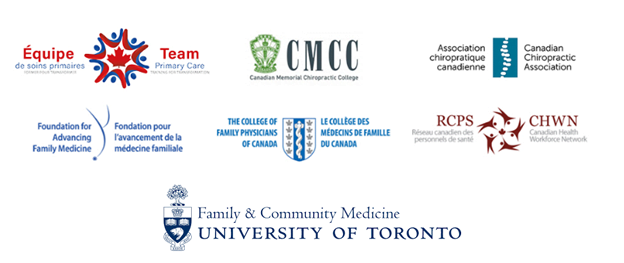All hands-on deck!


An interprofessional project to model the integration of NMSK care on funded primary care teams
The cross-Canada project: “All hands-on deck! Enhancing comprehensive primary care by integrating musculoskeletal care (chiropractic) on interprofessional teams – supporting education, competency attainment and optimizing integration” led by Drs. Deborah Kopansky-Giles (CMCC) and Ayla Azad (CCA) received the maximum grant award from the Foundation for Advancing Family Medicine (FAFM) – Workplace Integrated Demonstration Project Grant (WID).
“This study provides the opportunity to model the integration of chiropractors as integrated MSK experts in funded primary care teams in Canada.”
– Dr. Kopansky-Giles
The FAFM’s WID program aims to develop the capacity and adaptability of the comprehensive primary care workforce, and to sustain the adoption and optimization of interprofessional teams for the delivery of primary care.
“Our team is very proud to receive funding from the Foundation for Advancing Family Medicine that recognizes the need to enhance primary care by inclusion of health providers not typically funded within our health care scheme in this way. It’s a great opportunity for our profession to continue work on advancing integrative care in collaboration with other primary care providers. It is really what we have been working toward over many years and where chiropractors should be in order to improve access to our services for people,” said Dr. Kopansky-Giles. The project is funded over an 11-month period of time, and while this is a fast-paced study, Kopansky-Giles is confident that the team of 18 researchers including MDs, DCs, nurse practitioners, physiotherapists, clinical staff and administrators, and research assistants will effectively roll out the project’s three core activities: inter disciplinary education, collaborative competency enhancement, and creating opportunities for MSK integrated care.
Dr. Kopansky-Giles has spent much of her career working on local and global interprofessional healthcare teams and committees developing programs and models of integrated health services as well as conducting research on how this can be improved. A faculty member at CMCC for over 35 years, Dr. Kopansky-Giles is currently a professor In the Department of Research and Innovation. She is also an Assistant Professor in the Department of Family & Community Medicine at the University of Toronto where she has been involved in the advancement of health professional trainee education and research on interprofessional education (IPE). Dr. Kopansky-Giles currently divides her time between her research and Graduate Education position at CMCC and overseeing IPE at St. Michael’s Hospital (Unity Health Toronto) as well as the CMCC chiropractic intern and residency training programs.
“In the hospital, my work is focusing on is overseeing the chiropractic program that we’ve had there since 2004, teaching other health professional learners, overseeing IPE in the department and working on multiple hospital committees in addition to conducting research.
Dr. Kopansky-Giles has been involved in multiple local, national and international initiatives involving integrated health care and musculoskeletal health over her 40-year chiropractic career, 35 of which were also spent in combination with private practice. She is currently involved in work related to the World Health Organization’s (WHO) Integrated People-Centre Health Services program, WHO Health Workforce, WHO Healthy Aging program and WHO World Rehabilitation Alliance. She is also a member of the WHO Collaborating Centre on Primary Care and Family Medicine (based at the University of Toronto). Dr. Kopansky-Giles is on the Executive Committee of the Global Alliance for Musculoskeletal Health, is a board member of World Spine Care Canada, on the Global Spine Care Initiative scientific secretariat and on the OCA Evidence-Based Framework Advisory Council. She had the privilege of sitting on the OCA and CCA Boards for several years and representing the Canadian Chiropractic Association on the World Federation of Chiropractic for 15 years.
From early on in her career, Dr. Kopansky-Giles had the unique opportunity to work with interdisciplinary teams including family doctors, sports psychologists, physicians, and orthopedic surgeons. She recalls being able to go down the hall and talk to the doctors (hallway consults), or vice versa, to share experiences and perspectives to then work together with patients to support an effective plan of management.
From firsthand experience, she is now undertaking this project to create a national level approach to improving patient outcomes. “I really felt like the only way to really change health systems, is to change the learner’s perspectives while they’re training,” she said.
All hands on deck! Enhancing comprehensive primary care by integrating musculoskeletal care (chiropractic) on interprofessional teams – supporting education, competency attainment and optimizing integration
The project is divided into three elements: inter disciplinary education, competency enrichment, and opportunity creation – all couched within a research project. We hope that a positive outcome from this project will help to support further consideration of chiropractic integration within publicly funded primary health care teams by establishing a model which can be scaled up to other settings. We hope that it will ultimately lead to changing the way Canadians receive NMSK care.
Education
The education element consists of a two phased approach to comprehensive education. This will include information about the burden of musculoskeletal conditions in Canada, about integrative care and the evidence for chiropractic service inclusion, and about exiting, successful models that can be emulated into other contexts (such as the St. Michael’s Hospital (SMH) family medicine model). The SMH model has been identified as a leading practice by the Ministry of Health in Ontario, by the Health Care Innovation Working Group at the federal level, and by the WHO as a global leading practice in integrated, people-centred health services.
Education will be delivered synchronously (live, virtual webinar) to several primary care teams consenting to participate in the study. This education will be evaluated through a mixed methods approach. Asynchronous education will be offered across Canada to chiropractors and other primary care practitioners by virtue of pre-recorded webinars made available by the CCA, the Centre for Effective Practice and the University of Toronto.
CCA members will soon be requested to join the project by participating in an educational element later this year via training modules on the CCA Learning Lab.
Collaborative Competency Research
The second element of the project is looking at the micro competencies needed by health providers for effective collaboration. Adapting from existing frameworks that Dr. Kopansky-Giles has developed in the past with a team from the hospital, this piece of the project is about utilizing the collaborative competency framework for teaching clinicians who are already in established practices and who are interested in enhancing the opportunity to work in comprehensive teams. “It’s really teaching clinicians about the elements needed to optimally work as a team,” explains Dr. Kopansky-Giles. It’s a very different experience teaching and receiving this training when you’re already in practice because most of the clinicians were all educated in their respective silos and have not had the opportunities to be educated inter-professionally, she says.
Opportunity Creation
The third element is to enhance or create the opportunities for integrating a new MSK provider into a family medicine or primary care team. There are two clinics where services are already in place that can benefit from enhancement of the MSK care provided by chiropractors at Mount Carmel Clinic in Winnipeg, M.B., and the Centre of Hope in St. John’s, N.L.
Both clinics have chiropractors embedded in them, “But it’s not optimal. So, we’re going to enhance those two by working with them to learn about where they see the enhancements happening.”
A third primary care clinic which currently has no MSK services integrated, will be also included in the study.
A national project of this scope is only (as Dr. Kopansky-Giles coined “pull-off-able”) in such a short timeframe due to the incredible interprofessional study team, including:
- AYLA AZAD, CEO, Canadian Chiropractic Association
- JULIA ALLEYNE, Family Physician, University of Toronto DFCM
- ANNE DABROWSKI, Centre for Effective Practice, Toronto
- DIANA DE CARVALHO, Researcher, Memorial University
- SUNNY DHILLON, Director of Primary Health, Mount Carmel Clinic
- SHEILAH HOGG-JOHNSON, Researcher, CMCC
- FOK-HAN LEUNG, Family physician, St. Michael’s Hospital and University of Toronto
- SILVANO MIOR, DC, Researcher, CMCC
- STEVEN PASSMORE, Researcher, University of Manitoba
- JUDITH PERANSON, Family physician, St. Michael’s Hospital and University of Toronto
- JAIRUS QUESNELE, Chiropractor, Northern Ontario School of Medicine University and Laurentian University
- SORUBA VIJAYARATNAM, Nurse Practitioner, St. Michael’s Hospital
- DARRELL WADE, Chiropractor, Centre of Hope, Newfoundland
- AUDREY TOTH, Chiropractor, Mount Carmel Clinic, Manitoba
- PEGAH RAHBAR, Research Assistant, CMCC
- CRYSTAL DRAPER, CCA Liaison
Each of the study team members bring unique expertise and connections to the project to make it a truly interprofessional, collaborative healthcare endeavour to reach the goal of enhancing patient care.
“For me, it never made sense not to be practicing in collaboration with other folks…I valued the ability to easily reach out and get someone else’s opinion who had more experience and perspective on an issue or patient problem,” said Dr. Kopansky-Giles. “I think one of the most important core elements is that ‘it’s all about a patient,’ – when this is your true focus, then egos are left at the door and then hierarchies disappear, and the team works as one. This is the work that I’ve been privileged to do at CMCC and at the hospital: leveling the hierarchies and enhancing team-based care – everyone bringing their unique scopes of practice and skill sets and maximizing the use of these skills That’s where I think we benefit patients the most.”
Please keep an eye out for updates in the coming weeks for details on how YOU can support this national strategy through participating in training modules on integrated care for primary care teams on the CCA Learning Lab.

